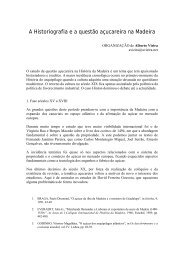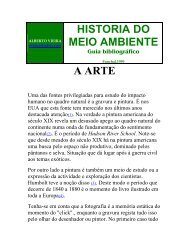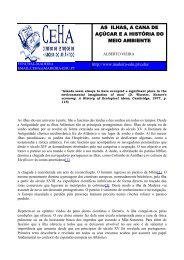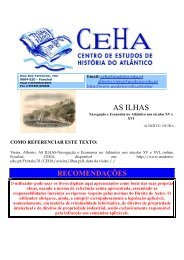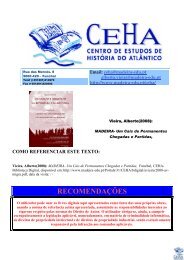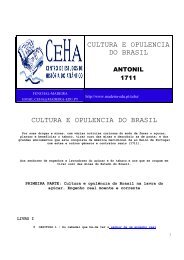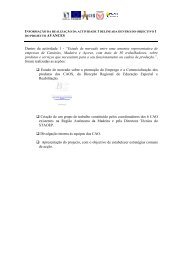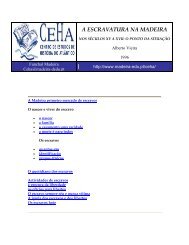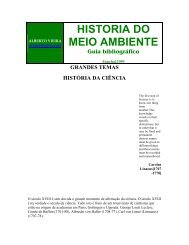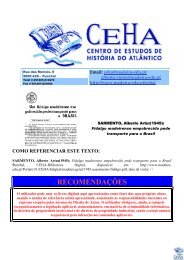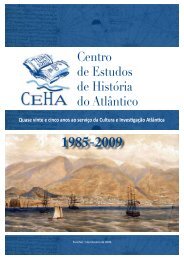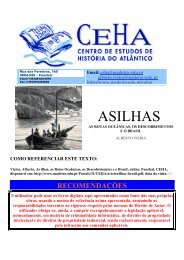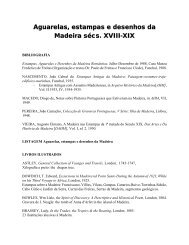SLAVERY IN MADEIRA
SLAVERY IN MADEIRA
SLAVERY IN MADEIRA
You also want an ePaper? Increase the reach of your titles
YUMPU automatically turns print PDFs into web optimized ePapers that Google loves.
In extreme cases it could happen that they had assured all the means to start a new life,<br />
that is, housing, clothing, bed, implements and farm produce, such as cereal and wine.<br />
But, the proprietor would never open hand of a piece of land that could be cultivated,<br />
obliging the emancipated to work for a wage or as leaseholders. This situation was untrue<br />
only two times, when the owners did not have legitimate successors.<br />
With or without legates from the owner, the slaves, once freed, should organise their life:<br />
first, lodging (clothing and bedding), then, work. The scarce possibilities of doing well in<br />
a society such as the Madeiran, profoundly hierarchic, made them a social group with few<br />
resources, as it can be observed either on the hospital testimonies that receive them, or on<br />
the disposition of the Death registers. In the last case we have thirteen declared as poor,<br />
and therefore were buried in the factory's ditch. To note that only sixty nine had the<br />
privilege of church services, which define well their financial possibilities.<br />
For all this, it is confirmed that the condition of the freedman in Madeiran society was<br />
not easy and that they came to enlarge the large amount of power labour and the fearful<br />
group of outlaws. The miserable conditions were made worse with freedom, as the<br />
protection of the lord was lost. They lacked enough means to survive in security. This<br />
way, at death's door, devastated by illness, they find rescue in the Funchal Charity<br />
Hospice, declaring misery, many times without anything to support the funeral expenses.<br />
Few are the freedmen that owned movables or immovables. When this happens, the<br />
origin is always a donation from the old proprietor. The short inventory of the goods, the<br />
reduced or null mess legates or burial obligations, also reveal the poverty state. The ones<br />
received by Funchal Charity Hospice did not forget to pay back by offering any goods<br />
that they might have.<br />
6. THE SLAVE, ALWAYS DEFENDANT AND NEVER VICTIM<br />
The presence of slaves in Madeira conditioned in an evident manner the regulating<br />
mechanisms of society at the political, institutional and religious levels. They, because<br />
strangers to the European society ramified in the island, implied the establishment of<br />
defining norms for their social contacts. It is necessary to refer that in Madeira, in<br />
opposition to what succeeds in slavish societies on the other side of the Atlantic, there is<br />
an intercourse and movement causing a peculiar social contact.<br />
In Madeira, the slave is part of the lord's daily life as to him he should maintain a<br />
bondage: there was no separation between the world of the slave and that of the free man.<br />
This way, with the norms in the form of by-laws, it was tried to perpetuate a situation,<br />
once anything contrary to it might endanger the established order. The fugitives or the<br />
slaves found isolated or in group constituted a problem for society. They were nearly<br />
always, a source for social conflict. The by-laws fought these situations, in forbidding the<br />
slave to have space for social contact. For this reason, the sociability of the slave was<br />
very reduced and was subject to many limitations. In accordance to a 1473 by-law he<br />
could not live alone or be received by freedmen. All these measures may be the mirror




